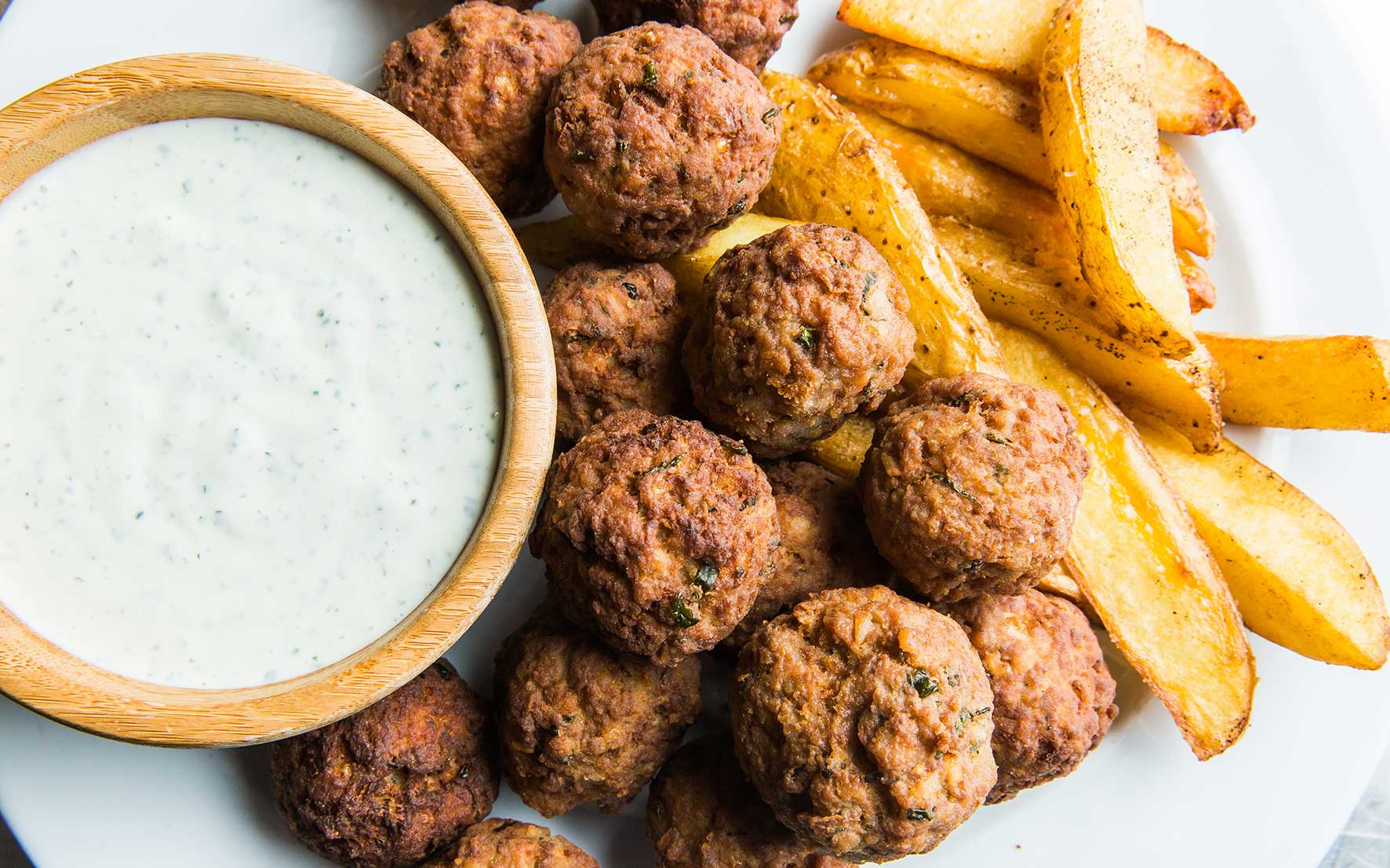How to Make Homemade Olives
A detailed guide to preparing homemade...

Juicy and fragrant, the humble Greek meatball.
© Dimitris Vlaikos
Chef: Christoforos Peskias
Preparation & Cooking time: 30min preparation, + 1 hour resting time, + 30min cooking time
Serves: 6 (approximately 35 meatballs)
Many meatballs have dedicated fans; people everywhere sometimes go to IKEA just for the Swedish meatballs, Japanese tsukune makes it into both soups and yakitori restaurants, and Americans love the Italian meatball as a sandwich filler. Yet, for some unknown reason, the Greek meatball is lesser known. Of course, most people who do try them become meatball converts. They’re impossible not to love – juicy and fragrant, they’re fried in olive oil, crispy on the outside, and fluffy on the inside.
In this recipe renowned chef Christoforos Peskias shares his vital secrets to ensure your meatballs obtain a wonderful crispy crust and delightfully fluffy core. To add flavor, in addition to the classic spearmint (which should be used in abundance), there is a humble surprise-ingredient that will take them to the next level.
Meatballs are not particularly complex nor do they involve challenging skills. They require quality ingredients and such handling so that they showcase their aroma and deliciousness. The meatball mixture is not a rough blending of the ingredients, but rather an opportunity to experience their unexpected characteristics. For me, this is the only secret for truly great meatballs, one of the finest dishes of Greek cuisine.
We start with the onions, which I do not use raw. I heat the oil in a non-stick pan over a medium heat and toss them in. The quantity may seem excessive, but I assure you that it is precisely this abundance that adds great flavor to the meatballs.
Sauté over low to medium heat for 10-12 minutes, until well-softened and slightly browned. I do not caramelize the onions, just let them release their sweetness gradually. Take the pan off the fire and let cool completely. The depth of flavor of slow-cooked onions is incredible.
Place the mince in a large bowl. I prepare the mince from a good cut of meat, chuck in this case. Perfectly fatty, and delicious. It would be a shame to devalue this delectable Greek meze by using flank, a cut that is only greasy and lacks the harmonious balance between fat and meat. I have the same approach regarding the bread I use: a good sourdough. When soaked in milk your standard white bread becomes a tasteless mush, while the sourdough crumb preserves its bite even when wet, with an incredible sourness, aroma and flavor.
Mix the mince with the bread, the onions with the cooking oil, the eggs, oregano and of course, the finely-chopped spearmint.
Another ingredient not commonly used in meatballs is the juice and zest of a lemon. It is amazing how much freshness and aroma this addition brings. It plays with the taste of the meat, making it lighter without adding anything unbecoming.
Add the lemon, season to taste and knead mixture intensely for 4-5 minutes. This breaks down the meat’s fibres and the mixture becomes fluffy, homogenous and relatively elastic.
Chill for 1 hour, until firm, giving time for the aromas to blend and come out.
After the time has passed, I make relatively large meatballs, about 30-35 gr per piece, and sprinkle them with flour on a baking tray (for convenience). Set aside in the flour until frying.
Heat the oil (only olive oil will do!) in a deep frying pan or a medium-sized pot – be sure the oil is about 3cm deep. Heat oil thoroughly, ideally to 180°C. At this point I want to say how important it is to have a simple cooking thermometer to precisely check the temperature of foods. Alternatively: as soon as the oil begins to steam, toss the meatballs to discard the excess flour and fry in batches, around 6-7 pieces at a time, for about 3 minutes.
Be sure to roll the meatballs around in the oil so that they cook evenly. During this process you may need to adjust the heat to prevent the oil from cooling or conversely, to prevent overcooking. Strain meatballs on kitchen paper (in a tray that fits them all in a single layer) and leave to cool slightly.
The sauce
Put all the ingredients for the sauce in the multi-chopper and pulse well for 1 minute, until the sauce is smooth and semi-liquefied. Serve meatballs with the sauce on the side, French fries and Greek salad.
To drink: A refined aromatic “new age” retsina, either white or rose.
This recipe was previously published in greek at gastronomos.gr.
For the meatballs:
3 large onions, finely chopped
80 ml olive oil
1 kilo beef mince, chuck, passed through the mincer
350 gr. sourdough bread crumbs, preferably stale, seeped in milk for 3-4 minutes and squeezed
2 eggs
1.5 tbsp dry oregano
20-30 fresh spearmint leaves, very finely chopped
Juice and zest of one large lemon
Salt & freshly ground pepper
Flour
Plenty of olive oil for frying
For the yoghurt sauce:
200 gr. Greek cow’s milk yoghurt
200 gr. Greek goat’s milk yoghurt
½ clove of garlic, crushed
10 fresh spearmint leaves, finely chopped
30 gr thyme honey
Salt & freshly ground pepper
A detailed guide to preparing homemade...
This article explores four cozy Greek...